While reporting her WPR feature story, The FARC’s Last Stand, Anastasia Moloney visited La Macarena, a mountainous jungle region in Colombia’s southern province of Meta. The rebel guerillas have turned the difficult terrain into their final stronghold in their efforts to withstand Colombia’s increasingly effective counterinsurgency campaign. A bird’s eye view of the Macarena jungle (Anastasia Moloney). Colombia’s elite counterinsurgency OMEGA force (Anastasia Moloney). Soldiers on patrol in Macarena (Anastasia Moloney). Soldiers on patrol in Macarena (Anastasia Moloney). Brig. Gen. Alejandro Navas, commander of OMEGA forces (Anastasia Moloney).
War & Conflict Archive
Free Newsletter
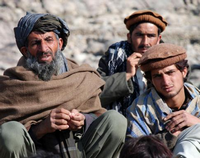
KAPISA PROVINCE, Afghanistan — Standing on the HESCO barriers that ring Forward Operating Base Morales-Frazier in Kapisa Province, just north of Kabul, one can see three enormous, beautiful valleys. To the north lies the Nijrab, whose “fingers” are home to a mainly Tajik population, with some Pashtun areas. To the east sits Afghanya Valley, which hosts Pashtuns in its lower half and Pashai in its upper half. And to the south is Tagab Valley, an almost entirely Pashtun area that has become famous for its entrenched insurgency. FOB Morales-Frazier, the soldiers it hosts, and the area it stands watch over […]

LA MACARENA, Colombia — Seen from the air, the sweeping mountains of the Macarena jungle in Colombia’s southern province of Meta stretch interminably towards the hazy horizon. The muddy Guayabero River snakes through this green land of deep canyons and forested valleys. It is here that Colombia’s largest guerrilla group, the Revolutionary Armed Forces of Colombia (FARC), clings to its last stronghold. Colombia’s southern provinces are the front line in the U.S.-backed counterinsurgency campaign against the guerrillas, the site of daily clashes between government troops and the FARC. Looking down from above on the rugged mountainous terrain, it is clear […]
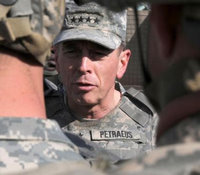
Internecine ideological battles have bedeviled the foreign policy of every U.S. administration in recent memory. Human rights liberals fought unsuccessfully with Cold Warriors for control of the Carter administration. New-right hardliners initially won the war for Ronald Reagan’s foreign policy soul but then lost it to George Schultz’s old-guard Republican realists. The Clinton administration became an altar on which liberal interventionists exorcised the Democratic Party’s Vietnam Syndrome demons. Most bitterly and most tragically, the first term of George W. Bush’s presidency demonstrated what happens when neoconservatives and their allies win more ideological contests than they lose. Barack Obama’s young presidency […]

JUAREZ, Mexico — In the past few months, the U.S. Army, attorney general, and various politicians have issued grave warnings about the atrocities taking place south of the Mexican border. They tend to describe a war that Mexico, because of deeply ingrained corruption, is incapable of containing on its own. But in one of Mexico’s deadliest cities the murder rate has recently plummeted, largely due to federal military intervention and an ambitious anti-corruption campaign. Following a spate of brutal killings early this year, media reports depicted Juarez as a war zone, a city on the verge of a humanitarian crisis. […]
After seven years in Afghanistan, it’s back to basics. On Friday, President Barack Obama unveiled the results of his comprehensive and long-awaited policy review of the U.S. war strategy in South and Central Asia. Reining in what has become a discombobulated mission, he asked outright, “What is our purpose in Afghanistan?” He then went on to answer his own question: Our purpose is the pursuit of al-Qaida and its leadership, Osama bin Laden and Ayman al-Zawahiri. There is little surprise in that decision. Likewise, the new way forward offered few unexpected headlines. The strategy will focus on an approach to […]

WASHINGTON — The new strategy for Afghanistan and Pakistan that the Obama administration unveiled today reflects a policy consensus that has been more than a year in the making. It is only recently, however, that the U.S. government has begun to take the lead in developing and implementing this new strategy. In the waning days of the Bush administration, U.S. allies — most notably the British government — as well as foreign policy wonks at think tanks in Washington and elsewhere began formulating an alternative policy for an Afghanistan war effort that had begun going downhill in the latter half […]
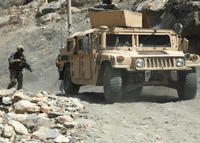
In his seminal essay the “Twenty-Seven Articles,” T.E. Lawrence wrote that “a bad start is difficult to atone for” in an insurgency or counterinsurgency effort. As the Obama administration prepares a new strategy for the war in Afghanistan, it is learning that lesson all too well. For more than seven years, Afghanistan has been the neglected war, impaired by insufficient resources, troops, planning and oversight. Facing a resurgent Taliban, the administration now has no choice but to chart a new path. Some of the president’s strongest supporters are urging him to scale down U.S. ambitions in the country. They contend […]
No one ever accused Israel of having a boring political scene. True to form, its next prime minister, Benjamin Netanyahu, pulled a rabbit out of a hat and, in one dramatic move, transformed the shape of his incoming administration. A government that was expected to empower a narrow right-wing coalition will now include the leftist Labor party. As a result, the incoming government will look much more palatable to the international community as well as to Palestinians. In addition, Netanyahu hopes, his coalition will prove much more stable and durable. Netanyahu, a former prime minister and leader of the rightist […]
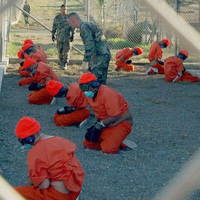
Almost as soon as President Barack Obama took office, a chorus of commentators began to demand the closure of the detention facility at Guantanamo Bay, in the hopes of ushering in a fundamental change in U.S. policy: ending the so called “war on terror” and the preventive detention regime, exemplified by the facility, that it had spawned. If one of President Obama’s first national security decisions was to order the closure of the facility within one year, the president’s decision was more symbolic than substantive. Contrary to the expectations of many Bush critics, nothing in that order would end the […]

KHOST PROVINCE, Afghanistan — The Army contractor reached into a green lacquered box and pulled out a clump of wires. He was holding part of the IED that had disabled his Mine Resistant Ambush Protection vehicle, or MRAP, just a few months before. “Here’s the thing I don’t get,” he said. “These guys use really nice German wires, but then they plug them into crappy, old, rundown Chinese batteries.” The explosion hadn’t done much, apart from frightening everyone inside. All it had left behind was a big hole in the dirt and a flat tire on the MRAP. But it […]
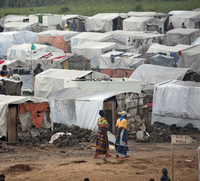
CONGOLESE COURT’S MAI MAI CONVICTION DRAWS APPLAUSE — A Congolese military court found Mai Mai commander Gedeon Kyunga Mutanga and 20 of his men guilty of charges that included crimes against humanity on March 5. The landmark conviction has drawn applause from the rights community as a significant step towards bringing accountability to the war-ravaged country. The court also found the Congolese government liable for failing to disarm the Mai Mai and awarded financial compensation to dozens of victims, setting an important precedent for the scope of responsibility in human rights cases. “This trial has shown the important role that […]

BOGOTÁ, Colombia —The drug wars in Mexico “will intensify,” says the head of Colombia’s anti-narcotics police, Gen. Álvaro Caro. “It’s going to get worse,” Caro said during an exclusive interview about the wave of drug violence in Mexico. “The Mexican cartels are very structured, well armed and organized, and have the power to corrupt.” Last year alone, 5,400 people were murdered in the surge in drug violence in Mexico. Caro calls it “narco-terrorism,” and says it is “the price you pay for taking on the cartels.” It also results from changes made by Colombian drug kingpins to their transporting routes. […]
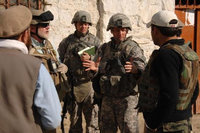
Oxymorons rarely work. Sure, people can’t get enough of jumbo shrimp. And there is a good reason why Shakespeare’s, “Parting is such sweet sorrow. . .” still resonates four centuries after it was penned. But on the whole, oxymorons tend to signal an inconsistency that is impossible to resolve. More and more, trends in American foreign policy reflect exactly this kind of incongruity. Take some of the concepts that have evolved over the past few years: warriors as diplomats, for instance, or soldiers as state-builders. Now, Afghanistan’s future, which will likely involve a “surge” of troops, places another seemingly discrepant […]
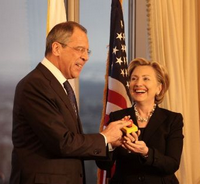
SLOPPY STAFF WORK — Secretary of State Hillary Clinton burst into raucous laughter when Russian Foreign Minister Sergei Lavrov pointed out a translation error on the “Reset Button” she gave him as a joke gift. The joke was on her, however, and in private she was less good-natured about the sloppy staff work responsible for the error. For one thing, it started her off at something of a disadvantage, however slight, with her Russian counterpart. For another, it pointed up an unfavorable comparison with her predecessor: Russian-speaker Condi Rice would very probably have caught the error in time. Such snafus […]

DENPASAR, Indonesia — Not very long ago, many observers considered Aceh, Indonesia’s formerly war-torn separatist province, a success story. But a recent rise in political violence has led Indonesian President Susilo Bambang Yudhoyono and Aceh Governor Yusuf Irwandi to warn against potential spoilers of Aceh’s peace process. Nobel Peace Prize laureate Martti Ahtisaari, who brokered the 2005 deal between the former secessionist Free Aceh Movement (GAM) and Jakarta, has also emphasized that a long-term resolution is far from ensured. Tucked in the westernmost corner of the Indonesian archipelago, Aceh’s conflict ended in the aftermath of the December 2004 tsunami that […]
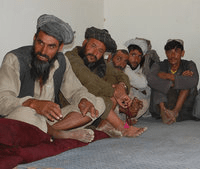
KAPISA PROVINCE, Afghanistan — Over scalding cups of tea in mid-February, an elder in Nijrab, Afghanistan said to me, “For two years you have come here and asked me the same questions. I like you, I like the French, but you people never learn.” He was referring to the generic questions Westerners ask Afghans: What is your life like? Where is the Taliban? What are your village’s needs? This particular elder has regular contact with American troops, and likes Americans enough to have tea with us. Nevertheless, he was deeply frustrated by the way, for all our questions, we never […]
